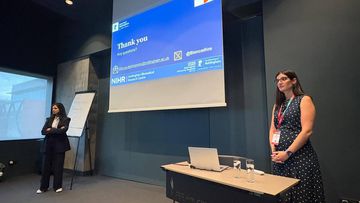Wellbeing and lifestyle – workstream update
The need to look at a wider picture of a person’s health, wellness and lifestyle, including nutrition, movement, sleep and stress, is becoming more widely accepted. Stress has been found to trigger relapse in MS (Mohr: 2004), and evidence around moving more and eating non-processed, natural food linked to improved mental and physical health across a range of conditions (list a few inc SMILES 2017, Neurology Academy: 2019).
This workstream wants to both:
- understand current practice relating to wellness and lifestyle through a baseline audit,
- begin to change future practice by encouraging a holistic review of patients within regular existing clinics
We would like to understand what most MS Centres routinely do for wellness and lifestyle so we can see the baseline we’re working from and know how best to target activity for the workstream.
Please can you answer 5 super-quick questions to give us a picture of your centre’s practices?
We’re looking for sites to take part in a baseline audit of centre practice around wellness for Q1-Q2. If you are interested in being part of the wellness and lifestyle workstream and becoming a pilot site to advance the way you and your team address this in your patient’s, please contact us or get in touch with workstream lead Dr Agne Straukiene.
A healthy lifestyle (HLS) update from Agne Straukiene, workstream lead
Agne has put together detailed slides outlining her vision for the wellness and lifestyle workstream. If you are enthusiastic about the overall wellness of those you support and want to incorporate more of a holistic lifestyle approach into your practice or Centre, these will provide a brilliant starting point. A brief summary is below.
Immediate action plan
- HLS initial survey of MS Academy faculty and alumni
- Form the HLS steering group – enthusiastic and interested people are needed to join the HLS work stream (ideally a mixture of doctors and nurses, dieticians, physiotherapists, social workers, personal trainers, sports medicine specialists, coaches and counselling psychologists)
- Easily achievable additions to make to existing MS clinics:
- Start measuring weight and height (BMI), BP in MS clinics (HCA in the OPD clinics can arrange whilst patient is waiting to be seen by MSologist) it raises awareness of weight problem and encourages patients and MS specialist to take action.
- Refer to health coaches, in the region healthy lifestyle clinics, Community & online HLS referrals
In the process / future action plan
- Provide tools for MS services to run/promote HLS in MS. Many links included in slidedeck (embedded above) form a starting point for this.
- Find partners of HLS work stream (OMS, Forks over knives programme, Happy GUT, HOPE programme etc)
- Create Wellness, Happiness and Healthy lifestyle educational videos for MS patients. This is already underway with scripts written and filming begun.
- Creating educational one- page booklets of Wellness, Happiness and Healthy lifestyle for MS patients
- Steering group to collaboratively create surveys for HLS clinics (healthy living attitude and HLS MS clinic assessment), at baseline when pwMS enter the HLS pathway and 12 months later and National HLS survey longitudinally.
They also outline all the areas that you can get involved, so please take a look and get in touch with us or Agne if you would like to be part of the steering group for this workstream.
Related articles
Encouraging excellence, developing leaders, inspiring change
MS Academy was established in 2016 and in that time has accomplished a huge amount with exciting feedback demonstrating delegates feel inspired and energised along their personal and service development journeys. The various different levels of specialist MS training we offer are dedicated to case-based learning and practical application of cutting edge research.


